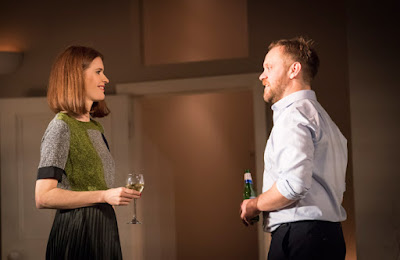'Beginning' review or 'Shall I Friend You?'
'Beginning', David Eldridge
National Theatre, 12th October 2017
Written for Exeunt
National Theatre, 12th October 2017
Written for Exeunt
We’re at the end of a long night. A house party has very much been had – and a fairly fancy flat in Crouch End is now decidedly less fancy. Food, drink, flowers and streamers are strewn across every last inch of every last surface. A large ‘Welcome to your Home!’ banner is visibly wilting. It’s 3am and only two people remain: new flat-owner Laura and ‘friend of work friend’ Danny. These two have been circling each other all night. David Eldridge’s play tracks (closely) the moment the circling stops and Danny and Laura let their guard down, and each other in.
Beginning is a very lovely play in lots of very lovely ways. It is easy to watch, easy to relate to and really funny. Sometimes, it all feels a little bit too easy but there’s enough ‘hard’ theatre out there to last a (very boring) lifetime so, overall, this makes a bloody nice change. With every lovely laugh (look at them dance; look at their woeful flirting!), you can feel the audience breathe and let go a bit. This is not going to be a difficult night at the theatre. This is a world that ‘we’ know (and yes – that ‘we’ comes with a hell of a lot of caveats), feelings we know, a set-up we can happily sink into.
Lots of Eldridge’s plays have been quite explicitly ‘hard thinky numbers’ and it’s nice to see him relaxing into his writing. This is a play that has come naturally to Eldridge: there’s an ease and openness to the writing. It feels honest. The dialogue flows. The humour twinkles. Time slides by and it is glowing time, time well spent.
This could’ve felt a bit slight, were it not for the quality of the acting, the precision of Polly Findlay’s directing (a movement director has also been used to really nail that first-meet dance), and the vulnerability of Eldridge’s characters. Findlay directs Laura and Danny’s anxious flirting with forensic precision. Every little moment draws us closer to these characters: Danny’s constant scampering across the room, Laura’s funny voice-changes, her angry clearing up and the slightly stilted way she moves about her own kitchen, all make this a deeper play than it might’ve been. We see more of these characters than they might like.
Justine Mitchell is a nice muddle of contradictions – bold as brass at some moments (‘Come over here and kiss me’) and open-wound vulnerable the next (‘I’m a shell of activity’). But this is really Sam Troughton’s play – largely, one suspects, because there’s an awful lot of Eldridge about this chap. As the night wears on, Troughton’s Essex geezer routine slides away and all sorts of sadness seeps out. There are a few blazing lines that hold a lifetime of feeling in them. In particular, this from Danny about his dad: ‘He broke my heart all my life’, and this line as Laura edges closer and closer to Danny’s centre: ‘I’m feeling a bit exposed.’
The only false note is a super-imposed arc about Laura’s need for a baby – and the possibility that said baby might be made this very night. It doesn’t ring true and it feels like a cop out – a clunky attempt to turn this subtle observational piece into a far more conventional play, with dramatic ‘high’ and ‘low’ points. It isn’t necessary. The small moments, the accidental slips, the dropped confessions, the gradual merging of private space into a shared moment, is more than drama enough.
One last note: Sam Troughton has clearly put on weight for this role and is a little pudgy round the edges. That’s proper commitment from Troughton and it means that when he eventually strips off, we feel for him in a range of interesting ways. Justine Mitchell, on the other hand, is super trim. When she strips down to her underwear, I am made to feel uncomfortable for all sorts of different reasons. I also feel a tad inadequate. It’s frustrating. In many ways, this production sticks courageously and intriguingly close to real-life (Fly Davis’s set is basically a North London flat wedged onto stage). Everything feels exceptionally real – except for the female character, who is so much more gorgeous and thin than most of us might ever hope to be. Is that OK? Why must theatre draw the line at this particular point when otherwise striving for reality?



Comments
Post a Comment